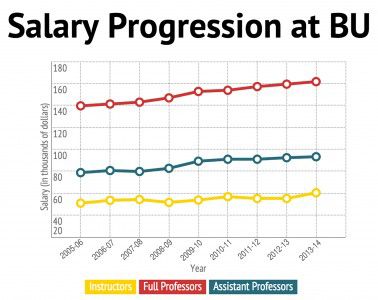
Boston University full-time professor salaries have increased over the last year at a rate lower than the national average, according to a report published Monday by the American Association of University Professors.
Full professors a BU receive an average annual salary of $161,600 and an average of $210,700 in total compensation each year, according to the report. This places BU as the 28th-highest paying university for full-time professors, on average, but near the bottom 50 percent in terms of percentage salary increase for the 2013-14 fiscal year.
“In the past year, raises in salaries are higher compared to the last four years since the recession started, but they’re still largely behind where salaries were before then,” said Samuel Dunietz, a research associate at AAUP.
After adjustments to inflation, the rate at which the average professor salary increased exceeded that of the cost of living by less than 1 percent, the report said.
The report attributed stagnant professor wages to universities investing disproportionately in administrative programs. It is worth noting that AAUP is not an independent analyst, but an organization of professors and academics whose mission statement is to promote the economic stability of faculty members, among other things.
“The salaries of faculty members overall has remained largely stagnant, whereas the salaries and compensation of administrators has increased,” Dunietz said. “Even just looking at the last five years or so, the comparison between [the two]… is pretty high.”
This pay disparity can negatively affect both the professors and the classes they teach, Dunietz said.
“If a faculty member is teaching multiple classes, then they don’t have enough resources, including other staff to help teach the course load and really effectively teach their own students,” he said.
Professors at BU have noticed modest salary increases in the past year and hold mixed opinions of the obstacles mentioned by the AAUP report.
Jelle Atema, a College of Arts and Sciences professor of biology, said his pay has gone up in increments over the years that allow for a comfortable living.
“It is probably just about keeping up with the cost of living, enough for me to keep peace with myself,” Atema said. “I have heard that other universities, particularly senior ranks, are rewarding their professors better.”
Atema said he noted a lack of educational resources, though he attributed it mostly to technological advancements in teaching.
“It’s had an awful lot to do with the computer age, where professors lecturing in the old days used to have much more support staff, but now we have to work more with computers,” Atema said. “It’s absolutely a challenge… You really have to work so incredibly hard just to stay in place.”
William Keylor, a CAS professor of history and international relations, said professor salary increases are comparatively small because BU is unable to rely on an endowment like Ivy League universities do.
“We depend on tuition, so if faculty members receive a salary increase then that is going to be funded largely by the students or their parents,” Keylor said. “By trying to keep costs down, that means you’re not going to have lavish increases in salary for faculty.”
Keylor said he wanted to extend praise to the benefits BU gives professors in addition to their salaries.
“The university has a very good benefits program for the faculty and staff – medical benefits and other benefits that don’t show up on the salary,” he said.
Some students have expressed mixed opinions as to whether the salaries of professors are sufficient.
Jessica Smith, a freshman in Sargent College of Health and Rehabilitation Sciences, said she believes professors at BU should earn more than they do currently.
“I feel like professors get underpaid compared to other professions, just because of societal values, like sports and entertainment versus education, for some reason, which isn’t good,” Smith said. “Professors are the ones that are actually teaching the kids.”
Shaunak Ramchander, a School of Management junior, said BU professors receive adequate compensation.
“Statistically speaking, I think it [a 2.4 percent salary increase] is fine if the average salary at BU is $160,000, since most colleges pay a lot lower than that,” he said. “If inflation is about 2 percent, then professors should be compensated for that.”
This is an account occasionally used by the Daily Free Press editors to post archived posts from previous iterations of the site or otherwise for special circumstance publications. See authorship info on the byline at the top of the page.



